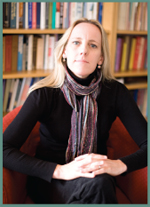EDITOR’S NOTE
 My husband once told me he’d go to church if it was fun. More specifically, he said he’d go if it included break dancing. His questionable sincerity aside, why do people go to church? For some, I think it’s a matter of focus—a way to stay mindful on a moral path. For others, it’s more about connecting. It’s about feeling inspired and feeling good. But can’t it also be about having a bit of fun?
My husband once told me he’d go to church if it was fun. More specifically, he said he’d go if it included break dancing. His questionable sincerity aside, why do people go to church? For some, I think it’s a matter of focus—a way to stay mindful on a moral path. For others, it’s more about connecting. It’s about feeling inspired and feeling good. But can’t it also be about having a bit of fun?
I recently attended my first Unitarian Universalist church service and will say the overall vibe was what I expected—welcoming, liberal, benign. The space itself was wonderful—kind of retro ’70s, earthy, calming, and surrounded by forest. I enjoyed aspects of the service very much and some of it reminded me of what I never liked about church. But as I sat there critically evaluating every element, I realized I’d been making a pretty naïve assumption about churchgoers in general, which was that people who regularly attend services like everything about them. But how could that possibly be true? People are just too complex and individual for that.
Which brings me to our cover story on the latest model of church for freethinkers: the UK-based Sunday Assembly, started by comedians Pippa Evans and Sanderson Jones (and possibly coming soon to a city near you.) “We’ve traveled around the world doing standup comedy and played to all kinds of people,” Evans observes. “So we know how to put together an event and connect with the room.” Assemblies focusing heavily on ethics and featuring sing-a-longs to the likes of David Bowie and Queen have become wildly popular, forcing the group to move to a 1,200-seat venue in East London. Sounds like heaven to me, but I can’t imagine it’s everyone’s cup of tea. However, as Michael Werner contends in his article on the need to re-infuse the UU church with humanism, “people want their religious communities narrowly focused, different, and demanding,” so these two jokesters may be onto a serious trend for a certain demographic.
Also in this issue we focus on autonomy and aging, specifically on assisted suicide and the ethics of elder care. These are matters of great concern to humanists and I want to acknowledge the bravery of one particular humanist whose end-of-life decision is detailed here, along with the courage his eloquent spouse has shown by sharing it.
Who should decide how a person’s life ends? And before that, who should decide how the fading mind is treated? In the issue at hand Al Rodbell examines one particular mandate in the new healthcare law that takes effect in January and expresses his concern that the medical establishment is going too far in diagnosing cognitive impairment and Alzheimer’s disease in Medicare patients, stripping people of their right to cope with normal memory loss as they see fit.
These are heavy topics indeed. But death with dignity in particular is being discussed more and more, and it’s important to acknowledge humanists as long-time advocates. On May 4 Nobel Laureate Christian de Duve legally killed himself after suffering with major illness for years. In June, BBC World Affairs Editor John Simpson, who spent four days living alongside Alzheimer’s patients for a BBC documentary called When I Get Older, announced that he plans to commit suicide when he reaches the point of severe physical or mental decline. Filmmaker Peter Greenaway echoed these sentiments in an interview with the Guardian last year, and asked: “Wouldn’t it be wise to make a good death for yourself? We all know that we’re going to die, but we don’t know when. That’s not a blessing, that’s a curse. … If you knew when you were going to die, wouldn’t you make your life more worthwhile?”
Heavy topics, heavy questions. But (and I think our cover duo would concur) compassion and humor can go hand in hand to assist in such matters. The actor Elliot Gould was recently asked in Compassion & Choices magazine if he thought people should be given the choice to die with dignity. “I was privileged to be Groucho Marx’s friend in his latter days,” Gould began. “And I recall the last time I saw Groucho: he was in the hospital, and he had tubes in his nose and what have you. And when he saw me, he was weak, but… he put his fingers on the tubes and went like it was a clarinet. Groucho played the tubes for me, which moves me to tears.” Gould concluded: “To be able to die with dignity is to be comfortable with the truth. I do… feel that that’s humane and that’s positive, and very beautiful and very loving.” I couldn’t agree more.![]()
—Jennifer Bardi
